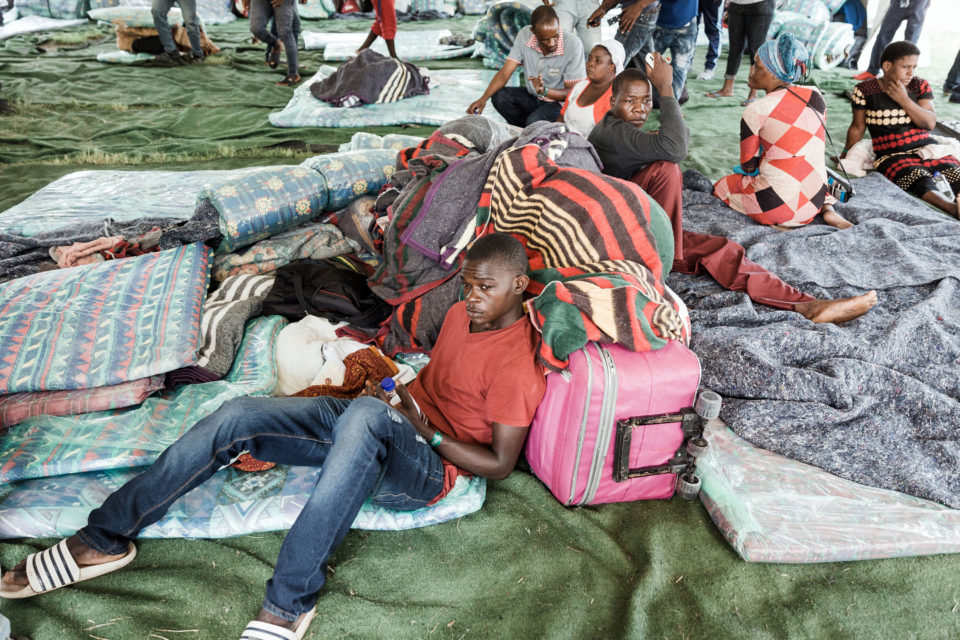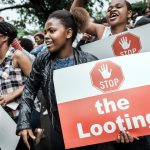Popular solidarity is an urgent imperative
The state is separating the South African-born from migrants born elsewhere in Africa. Such exclusion and xenophobia can be fought only by cultivating horizontal forms of solidarity.
Author:
1 April 2019

In 1955 the Freedom Charter declared that “South Africa belongs to all who live in it” and offered a vision of an inclusive and democratic future. By the 1980s the largely urban movements that developed after the Durban strikes in 1973 had developed commitments to radical democracy, and ideas like community and worker control had gained considerable popular traction.
But the limited liberal democracy entrenched in 1994 was not extended to all. The compromise made with the Bantustan system and traditional authority, a compromise that would shape the character of some of the new provinces, meant that millions of people would be subject to limited forms of democracy.
For many people access to rights was, from the outset of the new order, tied to forms of identity, which in turn were tied to place rather than being universal entitlements. It has become common for access to social goods, like government housing, to be mediated by forms of ethnic identity or geographic origin. In Durban, for instance, it is routine for senior politicians and officials to insist that people from the Eastern Cape have no right to access housing in KwaZulu-Natal, or to blame the shortage of housing on the presence of people from the Eastern Cape in the city.
Related article:
At the same time as the state re-entrenched ethnic and regional divisions it also sought to drive, in law and in practice, a firm wedge between people born in South Africa and migrants from other countries in Africa. At the level of discourse and practice this routinely exceeded legal conceptions of citizenship. From the outset the term “foreign nationals” was frequently used in a way that masked distinctions between documented and undocumented migrants.
The limitation of rights, and the active and deliberate creation of political and social divisions among the oppressed, has the same function in South Africa that it has everywhere else on the planet. It weakens the oppressed and strengthens the power of the elites that dominate them.
The long shadow of the notorious Lindela Repatriation Centre, projects like Operation Fiela, the longstanding conflation of the category of the “foreign national” with that of the “criminal”, and repeated scapegoating of migrants by politicians have all cohered to produce and sustain xenophobia. The result is that when social antagonism emerges from desperate circumstances it often follows horizontal rather than vertical vectors. This is in the direct interest of political and other elites.
We all know that routine acts of everyday xenophobic harassment are accompanied by sporadic state crackdowns and episodes of popular violence and looting. We all know that under these circumstances any encouragement of xenophobic sentiment from the political class is extremely dangerous.
When the ANC and the DA decided to incite and exploit xenophobic sentiment in their campaigns for the coming election, an escalation in both the routine harassment of migrants by the state bureaucracy and sporadic popular violence was inevitable.
Related article:
Last week the Molotov cocktails that politicians like Aaron Motsoaledi and Cyril Ramaphosa have been casually lobbing into the tinder formed by the conflation of desperate circumstances and longstanding state driven xenophobia ignited in three of the shack settlements on the steep hillsides of Durban. Three people are dead and many others have been displaced from their homes.
Now we are being told, as we have consistently been told since the xenophobic violence that left 62 people dead in May 2008, that the violence is “criminal” rather than “xenophobic”. This is a ridiculous position and an insult to the intelligence of the South African public. It is the equivalent of declaring that Kristallnacht – when German fascists committed extreme violence against Jewish people and property on 9 and 10 November 1938 – was criminal rather than anti-Semitic on the grounds that shops were looted. It is basic common sense that attacks that specifically target migrants and include the looting of their homes and shops are simultaneously xenophobic and criminal.
The function of declaring plainly xenophobic threats, violence and looting to be “criminal” rather than “xenophobic” is to externalise the blame onto a group of people imagined as being outside of ordinary society and to remove their actions from the sphere of the political. This is also why we are often told that the assassinations of activists, sometimes accompanied by brazen threats from local politicians, are “criminal” rather than “political”.
The reality, however, is that South African society is deeply xenophobic, with much of this sentiment, and its associated humiliation, exploitation and terror, being a direct result of the actions of the state. This reality needs to be acknowledged and confronted.
There is, though, nothing inevitable about xenophobia. As well as the reckless opportunism of many politicians and the everyday corruption of many bureaucrats, our society also contains sustained forms of popular organisation at significant scale, centred around residence or work, in which migrants have been welcomed and been able to ascend to high office. Some of these organisations have also sustained a commitment, year after year, to working with migrant organisations to explicitly oppose xenophobia.
This is where our best hope for alternatives to state-sanctioned xenophobia lies. In South Africa, as in much of the world, the cultivation of horizontal forms of solidarity is a vital imperative in a time in which political elites seek to sustain their authority by actively dividing the oppressed.


